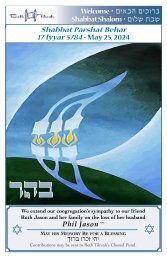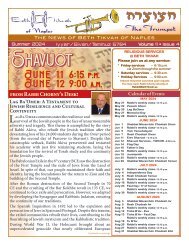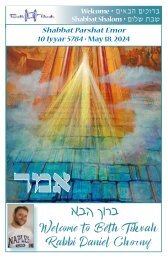Bulletin Korach
You also want an ePaper? Increase the reach of your titles
YUMPU automatically turns print PDFs into web optimized ePapers that Google loves.
Welcome • ohtcv ohfurc<br />
Shabbat Shalom • ouka ,ca<br />
Shabbat Parshat <strong>Korach</strong><br />
Rosh Hodesh Tammuz<br />
30 Sivan 5784 • July 6, 2024<br />
jre
Yahrtzeiten<br />
July 5<br />
July 6<br />
July 7<br />
July 8<br />
July 11<br />
July 12<br />
Anniversaries<br />
Lynn Nemes, Ilya Prizel<br />
Debra Antzis<br />
Ellaine Rosen<br />
Sima Bennett, Evan Kuperman, Samuel Levin<br />
Elan Kuperman<br />
Ezra Strobl<br />
June 26 Sima & Jonathan Bennett (40)<br />
vfrck oburfz<br />
July 5 • 29 Sivan Joseph Miller – Husband of Roberta MIller<br />
July 6 • 30 Sivan Dora Katz – Grandmother of Debra Silow<br />
July 7 • 1 Tammuz Sylvia Rosenblatt – Mother of Susan Schehr<br />
Joseph Hoffman – Father of Debra Silow<br />
July 9 • 3 Tammuz Max Stein<br />
– Father of Ralph Stein<br />
Alfred Walpert – Husband of Ferne Walpert<br />
July 9 • 3 Tammuz Max Stein<br />
– Father of Ralph Stein<br />
July 10 • 4 Tammuz Peter Portnoy – Father of Bernard Portnoy<br />
July 11 • 4 Tammuz Thelma Erenstoft – Mother of Edward Margulies<br />
Birthdays<br />
jna `skuv ouh<br />
Shabbat Kiddush Sponsored by:<br />
Debra & Michael Silow<br />
In loving memory of Debra’s father<br />
Joseph H. Hoffman k ”z<br />
cuy kzn
Torah & Haftarah Readings:<br />
Shabbat <strong>Korach</strong>: Numbers 16:20–17:24 (Cycle 2) (Etz Hayim p. 863)<br />
1. 16:20-27 2. 16:28-35 3. 17:1-5 4. 17:6-8<br />
5. 17:9-15 6. 17:16-20 7. 17:21-24 M. Numb. 28:9-15 (p.<br />
Haftarah: Isaiah 66:1–24 (p. 1219)<br />
Torah Commentary<br />
D’var Torah:<br />
Choosing the System – Bex Stern-Rosenblatt<br />
All the Israelites are chosen, but some are more chosen than others. It all started<br />
back with Abraham and God’s promise, saying, “I will make you a great nation and<br />
I will bless you and make your name great, and you shall be a blessing. And I will<br />
bless those who bless you, and those who damn you I will curse, and all the clans<br />
of the earth through you shall be blessed.” At that point, it was only Abraham who<br />
had been chosen. Abraham, in the biblical text, had done nothing in particular<br />
to deserve God’s attention, to deserve the status of having been chosen. Over the<br />
course of Abraham’s story, we see that chosen status transferred to his son Isaac,<br />
through no particular merit of his own. The status continues down the generations,<br />
to Jacob and his sons, and through them to all of Israel.<br />
In Genesis, chosenness and covenant are associated. The covenant God made<br />
with Abraham and passes down through the generations is what it means to be<br />
chosen. Moreover, Abraham and his descendants also engage in the covenant of<br />
circumcision. However, there is almost no other behavior expected from us in<br />
Genesis that would explain why we merited the status or how we might merit<br />
keeping it. Our ancestors engaged in all sorts of questionable behavior, from<br />
stealing birthrights, to trying to murder their brothers. It is not for their actions<br />
that these people were chosen. God just chose them.<br />
The covenant changes at Sinai. Demands are placed on us. As we read in Exodus<br />
19, “If you will truly heed my voice and keep my covenant, you will become for me<br />
a treasure among all the peoples, for mine is all the earth. And as for you, you will<br />
become for me a kingdom of priests and a holy nation.” In order to be in relationship<br />
with God, in order for God to continue to choose each of us as individuals, we have<br />
to choose God as well. When we do not, the covenant with Abraham still stands.<br />
God still has chosen the Israelite people forever. But God does not choose those<br />
individuals who do not choose God.<br />
Within this framework, God chooses the Levites as distinctive among the Israelites.<br />
We opened the Book of Numbers by trying to define the way in which they were<br />
distinct in their chosenness: “And you shall give the Levites to Aaron and to his<br />
sons, wholly given shall they be from the Israelites. And Aaron and his sons you<br />
shall single out, that they keep their priesthood, and the stranger who draws near<br />
shall be put to death… And as for me, look, I have taken the Levites from the midst<br />
of the Israelites in place of every firstborn womb-breach of the Israelites, that the<br />
Levites be mine.”
It is unclear whether the Levites are chosen because of who they are and what<br />
they do, in a way similar to the Sinai covenant, or if they are chosen just because,<br />
in a way similar to the covenant with Abraham. Having been chosen, they assume<br />
special duties. But we are never told why they were chosen for their particular<br />
role. Note also, that they are chosen to serve the Kohanim. They are chosen, but<br />
not the most chosen.<br />
Just two weeks ago, we read of Miriam and Aaron’s difficulties with the idea of<br />
chosenness. They are as chosen as you can get without being Moses. And yet it is<br />
not enough. Their complaint against Moses was in regards to Moses’s choices. If<br />
the only thing our patriarchs in Genesis did that mattered for maintaining their<br />
status was to choose wives, Moses seems to have failed on that front. It makes<br />
sense that Miriam and Aaron would use his choice of wife to dispute his status as<br />
most chosen. But there too, Miriam and Aaron are punished. It is not because of<br />
what Moses does or doesn’t do that he is chosen. He just is.<br />
In our parashah, Korah the Levite tries to understand the heart of chosenness.<br />
He tries to make it make sense. He tries to force God to move from an Abraham<br />
model to a Sinai model. Korah makes arguments about who he is and what<br />
he does as proof that he deserves a higher chosenness status. Instead, Korah is<br />
chosen to die.<br />
Chosenness is at the root of our existence, of our identity. The Israelites would not<br />
exist if God had not chosen us. From our perspective it is inscrutable. We cannot<br />
make it seem rational. We cannot force a connection between our actions and<br />
God’s actions. We are chosen into a system. That which we do not understand we<br />
should not try to break.<br />
Join ✺ Rabbi Chorny<br />
for his weekly discussion<br />
group, Tuesdays at<br />
12:15 p.m. via<br />
and IN Person<br />
Beth Tikvah of Naples<br />
1459 Pine Ridge Road<br />
Naples, FL 34109<br />
239 434-1818<br />
Visit us online at<br />
bethtikvahnaples.org<br />
or scan the QR code

















